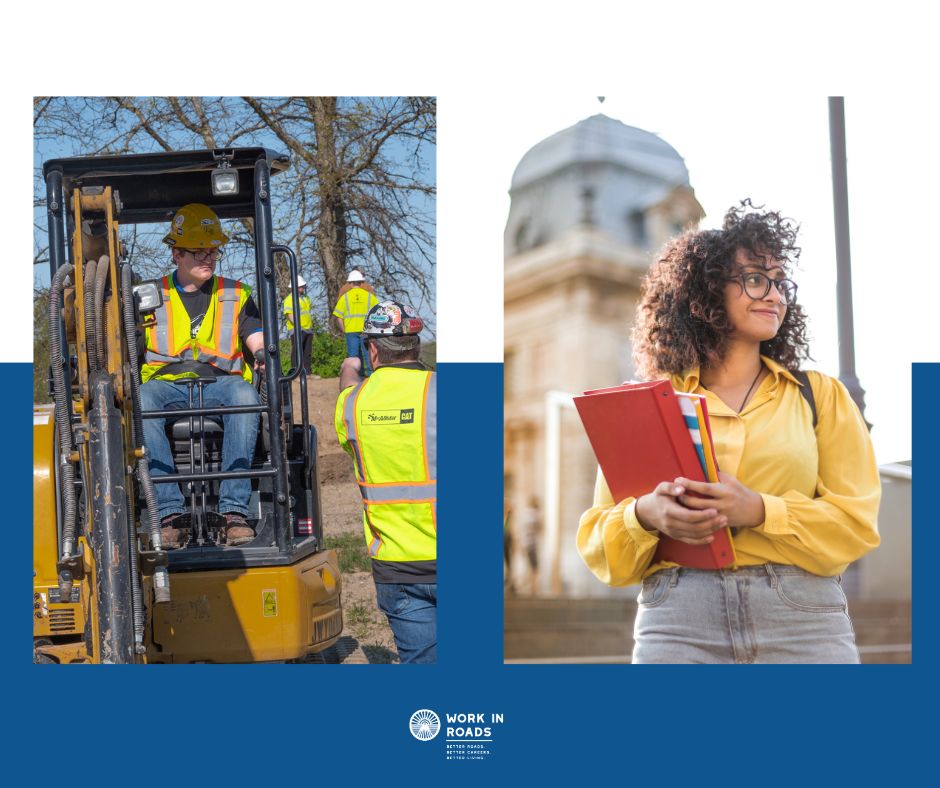As high school students approach graduation, they face an important decision: should they pursue higher education or enter the workforce? While college has traditionally been viewed as the best option for a successful career, there are alternative paths that can provide an excellent living, such as road construction.
In this blog, we will explore the benefits of a career in road construction compared to college and how to make an informed decision about which path to choose.

The Benefits of a Career in Road Construction
When researching “what to do next” after high school, you are often met with an alarming amount of possibilities and career choices. Each one tells you their career path or university degree is the best and suitable for you.
However, finding the right career will provide you with the things you want and need to succeed. Listed below are some of the reasons why a career in road construction is the right choice for so many people
Job Security
“Because of President Biden’s Bipartisan Infrastructure Law, today we are sending historic levels of funding to every state to help modernize the roads and bridges Americans rely on daily,” said U.S. Transportation Secretary Pete Buttigieg.
Road construction is crucial to maintaining and improving our infrastructure, which we need as a society to survive and thrive—making it a stable and secure career choice, especially in 2023.
High Earnings Potential
Road construction workers can earn a good salary without a college degree. Construction laborers earn a mean annual wage of 47,350 & construction managers make a mean yearly salary of 110,160, according to BLS.
Compare that to the annual mean wage for a full-time or salary worker in the United States, which is $53,490 per year or $1,028 per week (for a 40-hour work week).
Hands-On Experience
A career in road construction allows for hands-on experience and the opportunity to work with machinery. This work is challenging and rewarding, providing a sense of accomplishment when completing a project.
Opportunities for Advancement
Road construction offers opportunities for advancement, such as becoming a project manager or supervisor. These positions come with higher pay and increased responsibility, providing a clear career path for those motivated to succeed.
The Benefits of College
Increased Earnings Potential:
While a college degree may come with a high price tag, it also offers the potential for higher earnings. New information from the Federal Reserve Bank of New York indicates that the median yearly wage for a full-time worker with a high school certificate, aged 22 to 27, is $30,000 annually. It is $52,000 for a full-time worker with a bachelor’s degree.
Broadened Horizons
The college provides an opportunity to learn and explore new subjects and ideas, broadening one’s horizons and increasing their knowledge base. This exposure to different perspectives can be invaluable in a world becoming increasingly global and interconnected.
Career Flexibility
A college degree can open doors to a wide range of careers, providing flexibility and the ability to pivot if one’s interests or job market changes. This can be particularly valuable when job security is a concern in uncertain economic times.
Making the Decision of College Vs. Construction
Choosing between a career in road construction and college is a personal decision that should be based on an individual’s goals, interests, and priorities.
While a college degree may be the best choice for some, others may find that a career in road construction offers a more fulfilling and financially rewarding path. When making this decision, it is essential to consider factors such as job security, earning potential, and personal preferences.
Do What is Best for YOU
In conclusion, a career in road construction is a viable and rewarding alternative to college for those interested in hands-on work and career advancement opportunities.
However, the college also offers a range of benefits, including increased earning potential and career flexibility. When deciding between road construction and college, you must base your decision on your goals and preferences rather than doing what you believe society “expects:” you to do.
